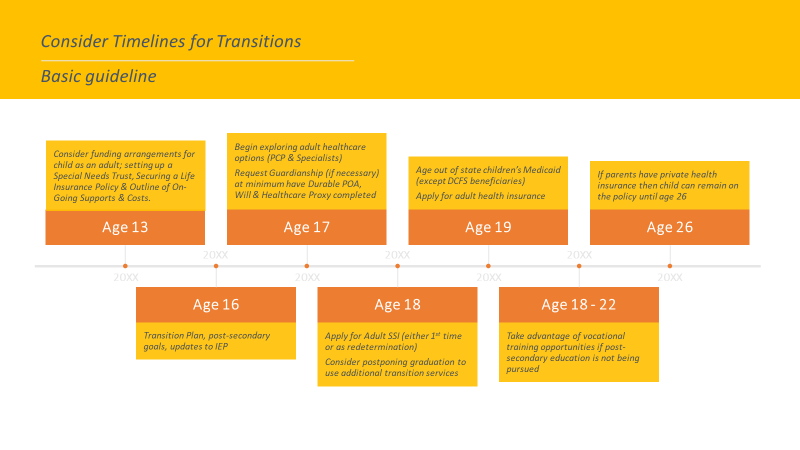By Tom Alessi
Due to the surge of COVID-19, we are all being forced to make changes and adjust to a “new normal.” While these adjustments may be challenging to all of us, the measures being taken to prevent the spread of COVID-19 can be particularly disruptive to and pose enormous stress for individuals of transition-age who also have learning or developmental disabilities. Here are some helpful tips and resources on how to support those individuals in the coming days and weeks.
Guideline for Transition Years

How does transition planning work?
Transition planning is done by the student’s IEP team.
At age 16, transition planning is more comprehensive and generally involves the provision of transition services. Students with disabilities are entitled to attend school until they graduate or turn 22. When a student with disabilities turns 18, the right to transition planning and services transfer to the student.
Age of Majority
In Massachusetts, regardless of the severity of their disability, students are considered adults and competent to make their own decisions at age 18 (Age of Majority). Unless there is a court appointed guardian or the student has chosen to share decision making with his or her parent, the school district must seek the consent of the student to continue the special education program. Students at age 18 have the right to make their own educational and medical decisions and must sign all consent forms.
Resources & Links
Appeals
Appeals can be made to the Bureau of Transitional Planning (BTP) relative to decisions about eligibility and the ITP. For more information call BTP at 617.573-.722.
Council for Exceptional Children (Division on Career Development and Transition)
DCDT focuses on the career development of children, youth and adults of all ages and exceptionalities, including transitions and career development of exceptional children.
The National Center on Secondary Education and Transition (NCSET)
The National Center on Secondary Education and Transition (NCSET) coordinates national resources, offers technical assistance, and disseminates information related to secondary education and transition for youth with disabilities in order to create opportunities for youth to achieve successful futures.
National Collaborative on Workforce and Disability for Youth (NCWD/Youth)
The National Collaborative on Workforce and Disability for Youth (NCWD/Youth) assists state and local workforce development systems to better serve youth with disabilities. The NCWD/Youth is composed of partners with expertise in disability, education, employment, and workforce development issues. NCWD/Youth is funded by a grant from the U.S. Department of Labor’s Office of Disability Employment Policy (ODEP).
Office of Disability Employment Policy (ODEP)
Through the Department of Labor (DOL) The Office of Disability Employment Policy (ODEP) provides national leadership by developing and influencing disability-related employment policy as well as practice affecting the employment of people with disabilities.
Students with Disabilities Preparing for Postsecondary Education: Know Your Rights and Responsibilities
The Office for Civil Rights (OCR) in the U.S. Department of Education is providing the information in this pamphlet to explain the rights and responsibilities of students with disabilities who are preparing to attend postsecondary schools.
National Secondary Transition Technical Assistance Center (NSTTAC)
NSTTAC assists states in building capacity to support and improve transition planning, services, and outcomes for youth with disabilities.
Tom Alessi is an Investment Advisor Representative at the Moody Street Group, LLC, in Newton, Mass.
